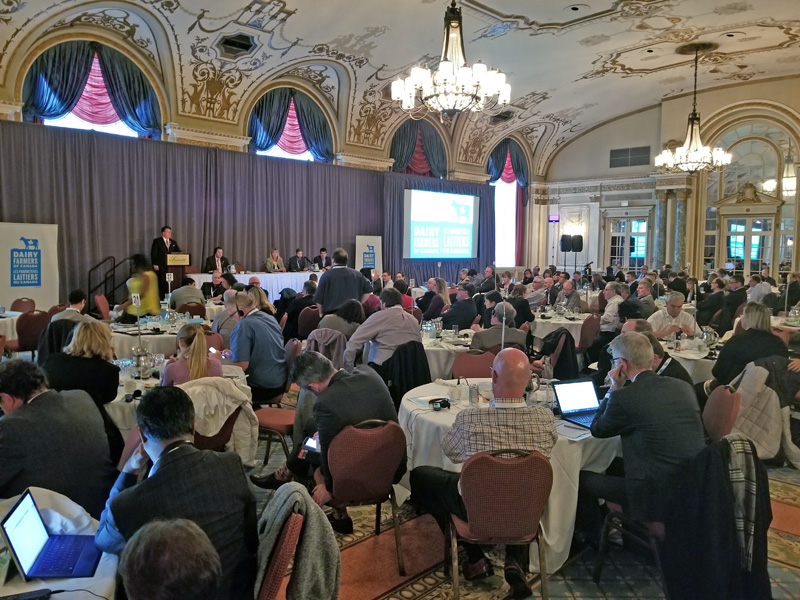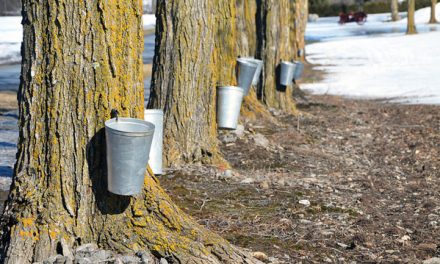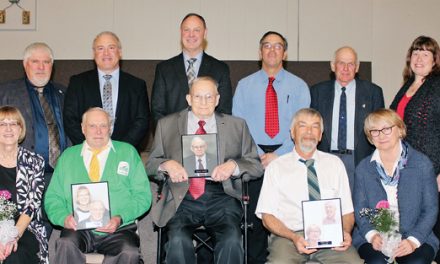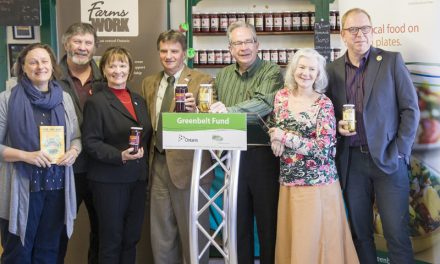Looking forward
Over 200 people gathered in Ottawa at the Chateau Laurier on Nov. 8, for the speaker panels and discussions about the future of the Canadian Dairy industry and how to become a sustainable force in global markets. Sawyer Helmer photo
by Kalynn Sawyer Helmer
AgriNews Staff Writer
OTTAWA – The Dairy Farmers of Canada, held their first-ever Dairy Sustainability Symposium in Ottawa on Nov. 7 and 8. The two-day event included two farm tours (see page 7), a wine and cheese evening and the speaker series and symposium on the second day. Over 200 agriculture representatives from across the board were present to discuss what sustainability in the dairy industry means, and how to ensure the future of Canadian dairy and agriculture.
Minister of Agriculture and AgriFood Lawrence MacAulay spoke in the morning. The question on everyone’s mind turned to the NAFTA negotiations. While MacAulay could not offer any absolutes he did seem confident in the benefits of the agreement.
“I have spent a fair bit of time in the United States. I think I’ve spoken to practically all if not all of the state secretaries of agriculture and a lot of the business community. To a person, I have not had anybody that said NAFTA was not a good deal. Be careful what you do, do not break something that’s not broken. Without a question that is the language that I have heard right through the States. I’ve been there six or seven times, met a lot of different people, met congress people here who ask to get things moving fast and to get it moving through. They understand that agricultural exports has quadrupled in the countries because of NAFTA. I have faith that the business community will make sure that we do it properly,” he explained. However when pressed about whether the White House has heard this message, MacAulay insisted, “I can’t speak for the White House, without a doubt they’ve heard it,” but he could not be positive whether the message had been received or considered.
Nevertheless, the Canadian dairy industry looks on to discuss the best way of bringing the industry into the future. “Canadian dairy farmers are deeply committed to sustainability, which is one of the reasons why our industry has been around for centuries here in Canada,” said Pierre Lampron, President of DFC, in a later press release. “We are continuously looking for ways to improve our on-farm practices, and are proud to tell our sustainability story. The Symposium was a great event to bring together dairy farmers and stakeholders from the food industry, to discuss various aspects of the sustainable way we produce Canadian milk, and what is needed to maintain confidence in the food supply.”
Producers present at the symposium understood the message of sustainability. As some pointed out, their farms have been in the family for multiple generations. A success which is only achieved by adapting to consumers and using sustainable practices. There was concern however, when imported goods are considered in which the same quality garnered by sustainable practices is not there, yet the price is lower and therefore appealing to customers. Drew Black, of the Canadian Federation of Agriculture, aimed to ease doubts by explaining the CFA’s role in trying to ensure imported goods meet the same quality standards required from Canadians. It was Cherie Copithorne-Barnes for the Canadian Roundtable for Sustainable Beef, who weighed-in that producers will be required to put a certain amount of trust in retailers and service partners to get their story out to consumers and those partners will rely on producers to have reliable sources of verification for the quality of their products. “If we don’t do it, we will be forced into it later. We have to put investment in to get value back and create that partnership with consumers,” said Copithorne-Barnes.
This partnership between producers and consumers must be fostered. Knowing this, Black spoke about the CFA’s Public Trust Steering Committee. The Committee relies on three pillars of a trust framework; doing the right thing, trusted assurance/verification and communication. “The entire Canadian food system has a role to play in building public trust,” said Black. The committee aims to act as a guide for each of the sectors in building trust. Governments must play a role through policy and third party credibility, while value chains and sectors, “hold responsibility to lead and shape appropriate standards and processes,” explained Black. “The Public Trust Steering Committee is the coordination and governance arm that provides objective guidance and holds accountability for delivering Canada’s public trust journey. The committee is a collection of fairly high level officials from government at federal and provincial levels, agriculture producers, processors, retailers, food service companies academics, NGOs and all the different multi-interest stakeholders coming together to help drive forward public trust and make sure the industry is in a position to be able to deliver on that. We have to stay abreast of consumer and public values, what are they asking for, are we in a position to offer that and how to best do so.”
This committee or hub of people and information helps further sustainability by creating a common language across all platforms. “From the Sustainable Beef side we look to that hub because we realize that we need to create that consistency in message and who better to give us the message that we need to deliver than that focus group that they have. So we take the information they give us and we are able to disseminate our information and build our insurance models based on what their recommendations are. So you get some consistency between all the agricultural commodities as well. We’re not even competing against each other and that helps drive consumer confidence,” explained Copithorne-Barnes.
On top of the common language throughout agriculture, Sustainable Beef has partnered with non-agriculture related organizations to drive the industry forward through best practices that are approved by environmental and wildlife organizations. On Dec.6 and 7, Sustainable Beef will launch the Verified Sustainable Beef Framework. This Framework will act as a tool to support producers and processors verify and demonstrate that their beef is sustainable, while also supporting retailers in sourcing sustainable products.
These frameworks are about creating allies in multi-stakeholder industries and building the trust system. For Sustainable Beef, the World Wildlife Fund are members within the organization. “They have paid to be a part of this just like the rest of us and it ensures that as we develop standards that they have to be comfortable defending the same standard as our producers are. And so we as producers can stand up there and say, ‘we are the most awesome people out there when it comes to grassland management’, but they can verify it for us. Or if we come under attack as an industry World Wildlife Fund can [back up our claims]. By being paid members you become allies rather than opponents. It just helps to get that understanding and common language and misconceptions out of the way because you’ve had time to discuss it,” said Copithorne-Barnes.
These initiatives in which the dairy industry and agricultural industry are involved are increasingly popular and necessary. “We need [as an industry] to be prepared to move in each direction the consumer wants,” said Copithorne-Barnes. Sustainability is not a question of if, but a question of when. Symposiums such as the one in Ottawa on Nov. 8, help to ensure the industry is not playing catch-up when the future becomes a reality.













